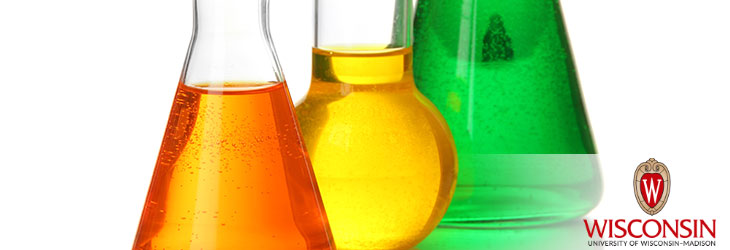Materials & Chemicals

Biodegradable Poly(Vinyl Ester) Block Copolymers and Related Poly(Vinyl Alcohol) Surfactants
WARF: P100170US02
Inventors: Mahesh Mahanthappa, Corinne Lipscomb, Milton Repollet-Pedrosa
The Wisconsin Alumni Research Foundation (WARF) is seeking commercial partners interested in developing a new class of biodegradable block copolymers and surfactants that degrade under mild conditions in the environment and in vivo.
Overview
Common biodegradable polymers such as poly(lactide) and poly (3-hydroxyalkanaoates) are derived from relatively expensive chemical feedstocks and have low melt stability. This presents a challenge for conventional processing techniques such as injection molding and melt extrusion, which can degrade the polymers and diminish their mechanical properties.
In contrast, new block copolymers and related surfactants derived from vinyl ester monomers possess much higher melt stability. They are also biodegradable and biocompatible materials that can be produced at low cost from available feedstocks.
Two homopolymer blocks that can be incorporated into these materials are poly (vinyl acetate) and poly(vinyl alcohol), i.e., PVA, both of which are considered safe by the FDA. They are utilized in a variety of applications from biomedical devices to chewing gum. Yet economically-produced polymer amphiphiles based on hydrophilic PVA segments are poorly explored due to a lack of synthetic approaches.
In contrast, new block copolymers and related surfactants derived from vinyl ester monomers possess much higher melt stability. They are also biodegradable and biocompatible materials that can be produced at low cost from available feedstocks.
Two homopolymer blocks that can be incorporated into these materials are poly (vinyl acetate) and poly(vinyl alcohol), i.e., PVA, both of which are considered safe by the FDA. They are utilized in a variety of applications from biomedical devices to chewing gum. Yet economically-produced polymer amphiphiles based on hydrophilic PVA segments are poorly explored due to a lack of synthetic approaches.
The Invention
UW–Madison researchers have developed PVA-based amphiphiles in which both the hydrophilic and hydrophobic blocks are biodegradable. Through careful selection of vinyl esters polymerized into a block copolymer structure, they have shown that ester functionalities along the backbone may be selectively hydrolyzed to unmask a PVA-block in a hydrophilic-hydrophobic diblock copolymer.
Given the well-known ability of PVA to self-associate and form gels, the polymer surfactants micellize and modify the rheological properties of the solutions in which they are dissolved. The tunable solution rheology of these surfactant dispersions, coupled with their environmental degradability, suits the polymers to a wide range of uses.
They can be synthesized using reversible-addition fragmentation chain transfer (RAFT) polymerization, organobismuth-mediated living radical polymerization or cobalt-mediated radical polymerization.
Given the well-known ability of PVA to self-associate and form gels, the polymer surfactants micellize and modify the rheological properties of the solutions in which they are dissolved. The tunable solution rheology of these surfactant dispersions, coupled with their environmental degradability, suits the polymers to a wide range of uses.
They can be synthesized using reversible-addition fragmentation chain transfer (RAFT) polymerization, organobismuth-mediated living radical polymerization or cobalt-mediated radical polymerization.
Applications
- Oil recovery processes
- Coatings and biomedical devices
- Cosmetics
- Biodegradable hydrogels with tunable mechanical properties
- Drug formulation agents
- Tissue scaffolding and regenerative medicine
- Guiding the differentiation of human embryonic stem cells in the absence of growth factors
- Specific biological targeting
Key Benefits
- Biodegradable
- Tunable nanoscale morphologies
- Higher melt stability
- Amenable to conventional processing methods
Tech Fields
For current licensing status, please contact Jennifer Gottwald at jennifer@warf.org or 608-960-9854